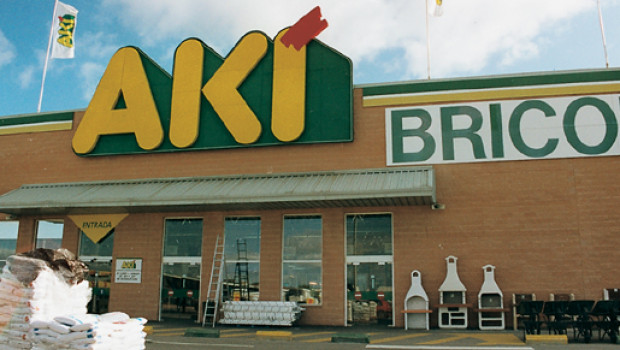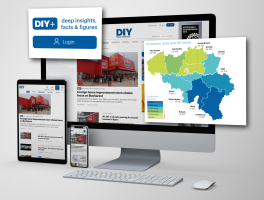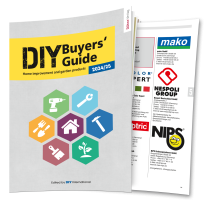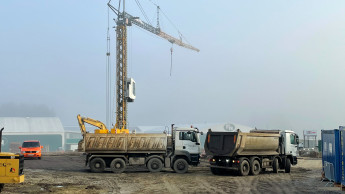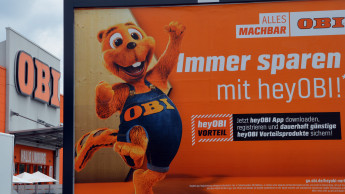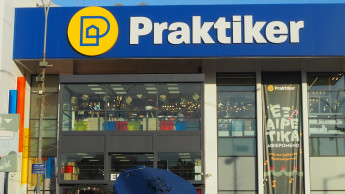The number of DIY retail groups in Spain is growing slowly but surely
Many of the approximately 9 500 hardware shops have linked up to form buying cooperatives. Under the Madrid-based Ancofe umbrella organisation alone there is a combination of eleven hardware trading cooperatives. There are 15 more cooperatives or central buying offices over and above this.
Having acquired the Aki stores, Leroy Merlin has consolidated its position as the number one in Spain.
The volume of the Spanish DIY market is given as 3.05 bn euro, according to a Fediyma study compiled in 2001. Even though doing-it-yourself does not have the same status in Spain as in France or Germany, it is evident that a DIY superstore-scape is gradually coming into existence, which will create competition for the hardware shops.
The central marketing and buying organisation, Habitacle, launched just this year.
The biggest DIY retail group is Leroy Merlin, which is now represented in Spain by 24 Leroy Merlin outlets and 19 Aki stores as well. It was 1989 when the French group opened its first DIY store in Spain. An important expansionary step last year was the acquisition of the Belgian GIB group’s 18 Aki outlets, which had originally been sold to Vendex KBB of the Netherlands before going to Leroy Merlin. The takeover was not approved until the beginning of April this year. The ministry of economic affairs had reservations about the sale, fearing that Leroy Merlin would gain a dominant position in the market through the Aki takeover, but this was not a problem in the eyes of the com- petition authorities. They confirmed that Leroy Merlin had a market share of seven per cent following the acquisition of the Aki stores. This view of the market takes into consideration hardware shops, supermarkets and hypermarkets as well, whereas the ministry of economic affairs only took into account the large-scale DIY stores, and so arrived at a market share of 70 per cent.
The new big name in the Spanish DIY market has 40 stores and employs a workforce of around 4 000. The profiles of the two brands are clearly delineated by retail area: Aki operates stores up to 4 000 m2 in size and Leroy Merlin those in excess of 4 000 m2. The programme of expansion is set to continue. Plans include this autumn’s opening of the 25th Leroy Merlin, which was originally announced for the spring. Aki is also remaining in expansive mood, having opened its store number 19 at Zaragoza in February. Two more stores are planned for the second half of the year in Vilanova (2 547 m2) and Asturias (3 900 m2). The growth plan envisages between four and five new openings per year until 2010. Which means that there should be about 50 DIY stores operating under the Aki logo by the end of 2010.
Leroy Merlin is not the only French DIY company in the Spanish marketplace. Mr. Bricolage currently has two outlets there, though its total number of affiliated companies has gone steadily down. Whereas the franchise group still had eight stores at the end of 2000, they were down to four at the end of 2001 and two at the end of last year.
However, a third French operator is making an appearance: Castorama is to become established in the Spanish market, which it estimates to be worth over 8 bn euro. Competition in Castorama’s eyes will come from the 23 000 small hardware shops, plus Leroy Merlin with its total sales of 590 mio euro. The Spanish version of Castorama is called Brico-Stock, will have a retail area of 4 000 m2 to 5 000 m2 and offer a range of products similar to that available in the Brico-Dépôt stores in France, with the emphasis on local products. September will see the opening of the first store of 4 800 m2 at Vallidad, not far from Madrid. Following in October will be one store each in Lorgona, close to the Basque region, and in Valencia. The slogan “Los precios bajos todos los dias!” will be used to advertise the stores’ permanently low prices.
Bricorama is yet another French DIY retail chain that has signalled an interest in the Spanish market.
“Ferreterias” are more than just the tiny neighbourhood shops.
A new central buying and marketing office going by the name of Habitacle was set up at the beginning of this year. Ehlis, which has already made a name for itself in hardware retailing through Cadena 88 (630 members with over 700 hardware shops), is the company behind the initiative. In addition to the benefits of a central buying facility, Habitacle also offers affiliated dealers an appropriate sales and/or marketing concept for retail formats ranging from 800 m2 to 2 500 m2. These outlets have a product offer covering hardware and tools, wood, flat-pack furniture and kitchens, paint and decorating lines plus garden products. The services available include cutting wood to size, as well as delivery and assembly services. Three stores currently belong to Habitacle.
This development shows that the Spanish DIY market is gradually following the example of other countries in Europe and increasing the number of DIY and builders’ stores, together with their head offices. With home ownership standing at 85 per cent and an increasing number of holiday homes and leisure properties, for which there is a growing demand for products from DIY stores, the market offers good prospects.
DIY retail groups in Spain
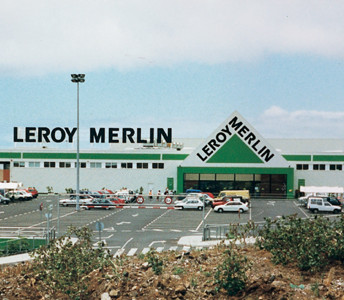
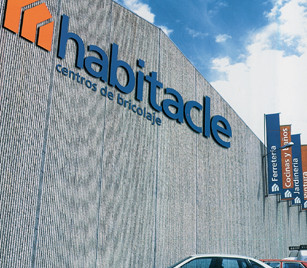
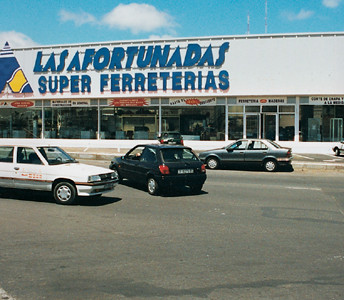


 Menü
Menü




